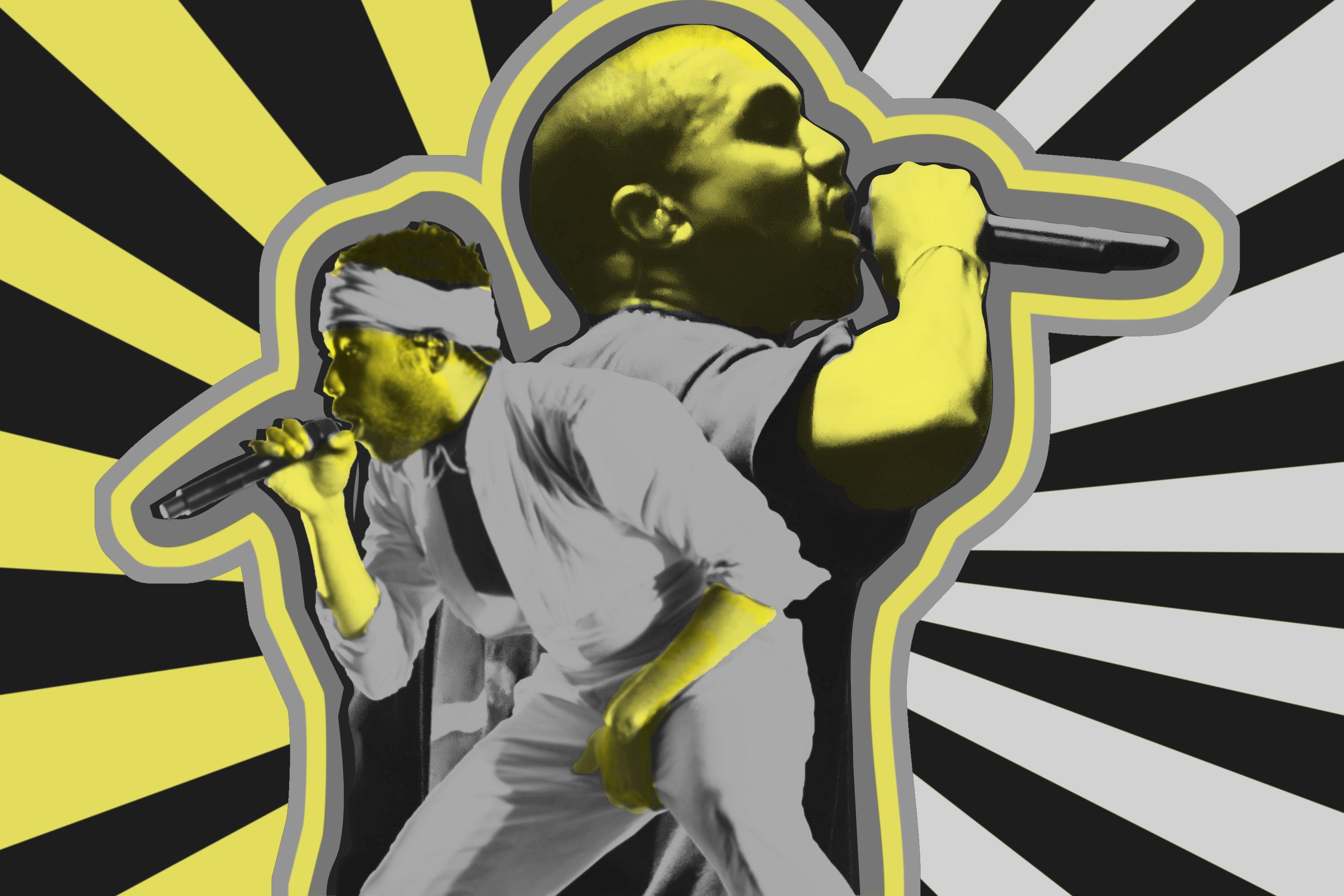
Kanye West and Donald Glover have fallen into an odd, indirect conversation with one another throughout Kanye’s ongoing reputational collapse. Their interactions have inspired some popular discussion of whether Glover might be regarded as West’s rightful successor, as far as black pop geniuses go, now that West has somewhat disgraced his blackness and further disproved his genius. The very term “genius” has, itself, become a curious fixture in how we understand both artists—black artists—as brilliant commercial artists. To call Beyoncé a genius is to call her a masterful entertainer. To call Kanye a genius is to call him a prophet.
Kanye started it. A few days after he praised the right-wing pundit Candace Owens, Kanye heaped similar praise on Glover, tweeting, “Donald Glover is a free thinker.” On Saturday, Glover hosted Saturday Night Live and costarred in a sketch, “A Kanye Place,” about Kanye’s recent tweets and the public nuclear reaction to them. Kanye tweeted a link to footage of the sketch. He also tweeted a link to the music video for Glover’s new song, “This Is America,” which Glover premiered on SNL and released hours after his performance. Clearly, Kanye’s taken a liking to Glover, whom he’s otherwise never collaborated with, at least not as far as we know. Kanye’s regard for “freethinkers,” and his definition of “freethinking,” is all over the place, so it’s difficult to parse what he means, exactly, when applies the terminology to Glover. But Kanye and Glover share a few, key traits. They’re black American men. They’re rappers whose broader creative talents defy brief summary. Indeed, they’re creators who struggled mightily at one point to be taken seriously in certain regards, even as they excelled in other contexts. They’re underdogs. They’re provocateurs. They both fluctuate wildly between progressive and regressive modes; they’ve discounted black women, and they’ve alienated themselves from black audiences and blackness in general.
For Kanye, the prevailing complications are all a recent development, though the rapper’s recent, reactionary turn seems to follow logically from his long-standing contempt for women as well as his quixotic demands for validation from wealthy, white titans of industry. Earlier in Kanye’s career, fans might have assumed that Kanye would ingratiate white power if only to challenge and co-opt it in favor of his black audience. In recent years, Kanye has gradually disproved this theory of his motivations, instead revealing himself to be obsessed with white power as the ultimate arbiter of his esteem. He begs to be compared to Steve Jobs and Walt Disney, he begs Mark Zuckerberg for money, and he begs Anna Wintour for respect. In favor of such approval, he has occasionally forsaken black media altogether. Thus, Kanye has settled into a mode that bears an awful resemblance to Donald Glover’s early, formative context. In the early 2000s, Glover—at the height of his stand-up comedy career—was the black nerd, bullied and misunderstood among his own people, left to vent his frustrations with the supposedly rigid confines of blackness to any white girl who might listen. He’s vented about black people to white audiences, and white audiences have loved him for it. But in the past couple years, Glover has reemerged as a once-in-a-generation artist who bends various media to fit his distinct personality. Not just an auteur, Glover is a new mastermind of the creative realm that critics often summarize as “unapologetic blackness.” Glover’s breakout hit, “Redbone,” a Funkadelic tribute, is “unapologetically black.” Atlanta is “unapologetically black.” Glover’s music video for “This Is America,” while controversial, is nonetheless “unapologetically black.” The song and its video—a comprehensive critique of racial exploitation in popular culture and permanent escapism despite dire times—echoes Kanye’s declaring, more than a decade ago, “George Bush doesn’t care about black people.” Thus, Glover restores balance to the force.
Glover’s racial awakening has made for some great entertainment, but it came unexpectedly and remains a mysterious development. Through all the magazine profiles and favorable essays grappling with his music, and his TV series, and his acting career, and his newfound importance, he’s never explained why he came to resolve his alienation from other blacks. Most charitably, one assumes Glover, whose earliest work suggested an obsession with childhood, matured. Least charitably, one assumes Glover realized that a black artist who disavows his own blackness renders himself largely useless to white audiences, who clamor for blackness as American pop culture’s most valuable resource. It’s a cynical reading of an admittedly cynical subject. In The New Yorker’s recent profile of Glover, the artist offers no hints, even as he looks back on one fraught instance, his tokenizing cameo as Hannah Horvath’s black, Republican boyfriend on Girls—a role that culminates with a rumination on interracial dating so preposterously candid as to defy all comprehension of how white people and black people actually interact. In the New Yorker profile, Glover flatly regards the early 2010s as a closed chapter. “Let’s not think back on mistakes we made in the past,” Lena Dunham told the magazine he said to her in an email, “let’s just focus on what lies in front of us.”
In his break with the past, Glover now inhabits a radically different persona—the solitary male genius. Glover’s cantankerous performance in the New Yorker profile is, supposedly, “unapologetically black,” and in a spirit reminiscent of Kanye’s fussy and bombastic encounters with Zane Lowe, Jimmy Kimmel, and Sway. Kanye and Glover are difficult men whose art encapsulates blackness, and then enamors black audiences and white audiences alike, while alternatively pushing and pulling against both groups. When fans compare Kanye and Glover, and whenever they describe either man as a genius, these are the key qualities they’ve isolated—they’re irascible, masculine black artists who strike at the bleak heart of America’s racial dynamic. Indeed, they embody the dynamic and all temptations, plus all the attendant perils.
The popular desire to appoint Glover as Kanye’s successor botches the lesson that fans might ideally learn from the latter artist’s fall from grace: It was foolish for anyone to task a musician with so much political significance and “genius” beyond the context of his music. Also, Kanye’s not even gone. He’s still tweeting. Supposedly, he’s still dropping his albums in June, and his previous music remains available on all the major streaming services. His interviews and his greatest sound bites are all cropped together on YouTube. In full, his genius is preserved as beautiful music, captivating performance—and a warning. Donald Glover may succeed Kanye West, but the very worst outcome—the outlook that their similarities prefigure—would be for Glover to impersonate him and otherwise resemble his shortcomings, his resentments, and his betrayals. Glover must take care to account for his racial priorities. And so, too, must Glover’s fans.

